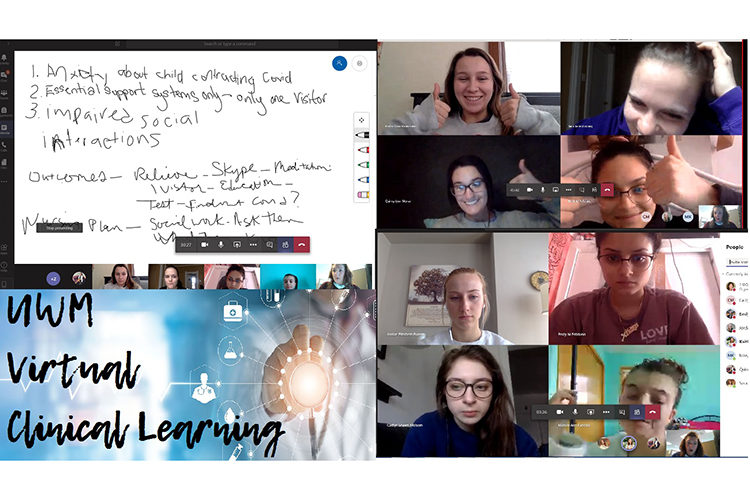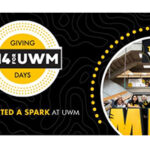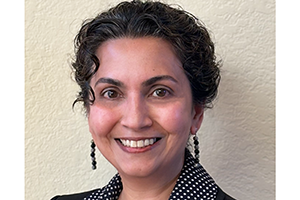When the coronavirus pandemic struck, it wasn’t just doctors and nurses who leapt into action. It was UWM students, too. Students have been working in public health, nursing, mask-making and other necessary tasks.
Here are a few of their stories.
Educating the public
Kayla Bonack, a graduate epidemiology student in the Zilber School of Public Health, was hired as an intern at the North Shore Health Department in January. Within weeks she found herself helping out on the front lines of coronavirus education and communication for the six communities the department serves.
“My role has definitely shifted a lot.”
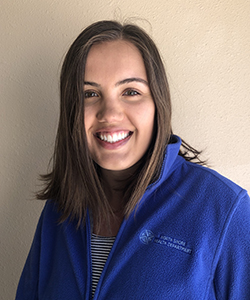
She’s involved in working on the department’s website, doing a monthly newsletter, staying connected with the state health department for the latest data and helping with daily briefings.
To say it’s challenging is an understatement, she said.
“Every day we get new information about the virus itself as well as the guidelines we should be following for isolation and quarantine. It’s challenging because there are so many unknowns.”
On a personal level, her life has shifted a bit. For one thing, her commute has been simplified. She’s moved out of her downtown residence near Zilber to her parents’ home in Waupun, commuting to the health department’s Brown Deer office several times a week or as needed. She’s also doing her public health coursework from there.
North Shore community members are grateful for the information, sending cards and letters thanking nurses and the staff for their efforts, Bonack said. “We’re trying to offer some help and guidance when people are really scared. It’s cool to see the community express their thanks.”
* * *
‘An entirely different type of medicine’
Julianna Doniere is a graduate student in the Zilber School of Public Health. As an emergency room doctor since 1996, she has a front-lines view of what is happening during the coronavirus pandemic.
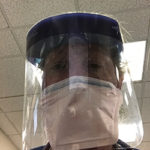
“It’s an entirely different type of medicine than I was practicing two months ago,” said Doniere. “This is a whole new virus, and we’ve had to learn a whole new standard of care for it. For every shift I have to educate myself on what’s new, what can I try.”
While the numbers of patients coming into the emergency rooms is down because of fears of contracting the virus, those who do come in with the virus are often “horrifically ill,” she added. She works in the emergency room at several Ascension hospitals, primarily at St. Joseph’s.
At the same time, her neighbors are leaving food on her porch and others are sending gifts and food to the staff. “We all laugh that we’re gaining the COVID-19 (pounds). The support we’re getting from each other and outside the ER is really wonderful.”
Doniere said her Zilber studies, focusing on community and behavioral health promotion, have helped her better understand the public health dimensions of the epidemic. “That’s what UWM has done for me, helped me look at people as not just a disease but the culmination of all the things that brought them to the ER. It’s helped me focus on how to help the person rather than just on how to fix what’s going on right then.”
* * *
Making hundreds of masks
When Ravin Schmitt found out that UWM friends who were working in the health care world during the coronavirus pandemic didn’t have enough masks for all their shifts, she decided to help out.
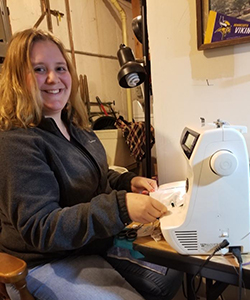
Schmitt, a fifth year student in the School of Education’s Early Childhood program, hadn’t had much experience other than hand sewing for minor repairs, but she had an expert teacher – her mom, Sara.
“My mom took time to show me how to make the masks, and it has been wonderful working with her,” Schmitt said. “She made the first few masks, and it just skyrocketed from there. It’s one way we could help out.”
Together they’ve made more than 400 masks, donating some and selling others at cost during the past semester. All the while, Schmitt was keeping up with her classwork online from her family home in Sun Prairie. She’s planning to take the summer off to help out at a camp where she’s worked for the past four years – if it opens.
Schmitt is scheduled to graduate in December 2020, and she’s looking forward to a career working with young children. “I chose this major because I absolutely adore children. Getting to see how their little minds work amazes me.”
* * *
Testing for the virus
Verity Dickens is a lab technician at Aurora Sinai as well as a senior in the College of Health Sciences. Part of her work is testing for coronavirus.
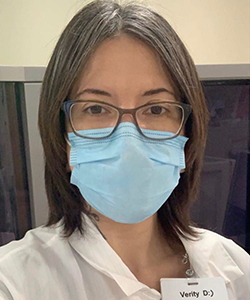
The weeks since the coronavirus hit have been an emotional roller coaster for her and her co-workers, she said.
“There have been some terrible days the first few weeks, but I hope they are behind me. Everyone here is incredibly supportive of one another.”
With a daughter in high school who’s home schooling and her health sciences coursework, Dickens feels the stress, and, like others, initially had concerns about her own health and that of her family. “I would say by far the most challenging part was wrapping our minds around knowing we were going to be handling the testing for this serious virus that isn’t well yet understood.”
However, she added, “Whatever fears I had about myself and my family, I can say as a tech I never doubted my need to go to work. I have an obligation to the community, whether I’m testing for COVID-19 or anything else. We test for all sorts of bad and often contagious diseases; this is not our first.”
What she has learned at UWM has helped her better understand the importance and impact of testing, she added. A supportive environment at work has also been helpful. “I am proud of the system I work for at this time and I really love this hospital.”
* * *
Working the surge tent
Lisa Gniot worked in the COVID-19 “surge” tent at a metro Milwaukee hospital emergency department. She is a registered nurse who is in the direct entry Master’s in Nursing program in the College of Nursing, and this summer plans to start the Doctorate of Nursing Practice program as an adult-geriatric acute care nurse practitioner.
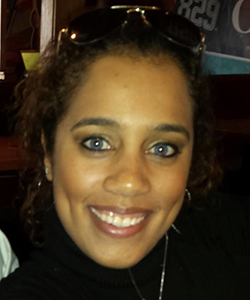
The surge tent was set up to help the hospital quickly assess the “walking well” patients with respiratory symptoms such as mild cough, sore throat or low-grade fever who could possibly be COVID-19 positive. After the staff assessed the incoming patients, Gniot swabbed all those eligible for testing. As patient numbers dropped, the tent closed, though Gniot still works in the emergency department.
“Balance is a challenging part of ED nursing. The process changes due to COVID-19 have been frustrating at times, due to the many updates to nursing policies and practices in just the past few months. It can be difficult to keep up with the ever-changing environment.”
What she’s learning at the hospital and at UWM have helped her develop her leadership skills and enhanced her ability to advocate for her patients, she said. “I have built so much confidence while building my nursing skills to openly share with leadership quality improvements that may be beneficial for the department.”
* * *
3D printing masks
When Nathan Feest learned that a local agency serving young people needed masks, he decided to help out.
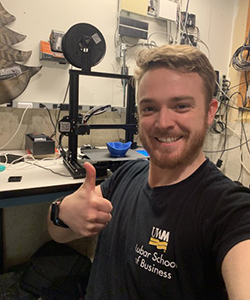
Earlier this spring, Feest who just graduated from UWM, received an email from the university’s Center for Community-Based Learning, Leadership and Research listing service opportunities.
His father had just bought a 3D printer, so the timing was perfect. Feest set to work making “Montana masks,” a type of face protection that can be printed and finished with pieces from N95 masks. The Montana mask doesn’t provide medical grade protection, but is a 3D-printable, highly effective filtration mask that can be fitted to the provider’s face and sanitized between uses to help prevent the spread of the disease.
Each mask takes from an hour and a half to four hours to print and creates about 85% of the mask. Feest then uses the pieces of N95 masks to finish them. One N95 mask can be turned into three or more Montana masks.
Feest completed 30 to 35 completed masks for Pathfinders so their current needs are filled. Right now, he’s informed friends and colleagues that he can continue to print components of the masks if needed. Sourcing materials can continue to be a challenge since people around the globe are trying to build masks, he said.
“Technology innovation exists to give people tools to perform tasks in ways they never have before, and that is exactly what the Montana mask does,” said Feest. “My father is also in technology, and I am thankful that he inspired me to work in a field where I am constantly innovating. This keeps me hungry and prepared for a lifelong journey of learning.”
Feest earned his degree in Information Technology Management and a certificate in International Business.
* * *
Tutoring students online
Imari Woods, Alexander Breen, Brendan Lenzner and Brian Hartling are master’s degree students in the School of Information Studies who offer walk-in tutoring for undergraduates in the Information Science and Technology program. They moved their tutoring services online to continue to help students who aren’t on campus, using Microsoft Teams and other online platforms.
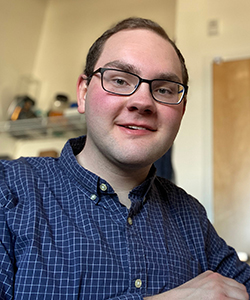
The biggest challenges for most students are getting used to use most of the tools/materials (video chat, chatting, Microsoft Team, Zoom) they have online to help with learning, Woods said. “Many of the students are not used to online learning and have never had to take an online class. They are mainly used to understanding and learning more face-to-face.”
Working on some projects is different, Lenzner said. “It can be more challenging because you can’t see exactly what’s happening with the code. It’s not the same as sitting down with them an going through it together in person.”
Breen, who is also a teaching assistant, tries to stay connected with students through phone calls and texts as well as tutoring. “A lot of people are scared, stressed out. You can see the changes in how this this isolation is affecting mental health.”
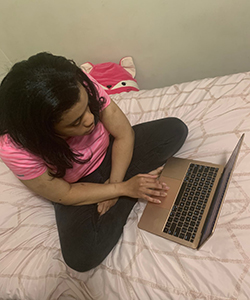
That’s why he encourages students to reach out whenever and however they can.
“Our SOIS community is strong. As long as we reach out and ask about people’s situations, we can help.”
“These students have stepped up in a very innovative way to help make this transition to online learning a bit easier for our students, “ said Rebecca Hall, communications director for SOIS.
“The most rewarding part is still being able to still serve students and help them with any needed work for school that they have,” Woods said.
* * *
Running a self-isolation site
Mai-Sher Jessica Yang is helping take care of people who’ve tested positive for COVID-19, but don’t have a safe place to isolate. Yang, who just finished her last semester at the Zilber School of Public Health, was working for the Milwaukee Health Department’s food safety area. When the coronavirus hit, the department put all staff possible to work on responses to the pandemic.
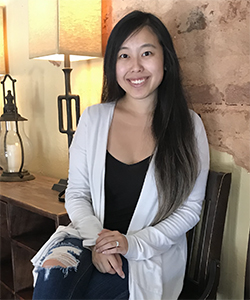
So she transitioned from doing food safety inspections for the Milwaukee Health Department to running a temporary isolation site at a local motel for people with no other place to self-isolate.
The work is challenging because residents are confined to one room and can’t really leave. “That definitely takes a toll on mental well-being.”
But it can also be rewarding, she said.
“A good part of our population is also housing insecure, so we try to help them find homes as well as recover from COVID.”
Yang worked in the medical field for a number of years, and came to Zilber to focus on the preventive side of health care. Her focus is Community & Behavioral Health Promotion.
What she’s learned in public health has helped her in her current work.
“It’s frustrating in the sense that things are always changing, but I’ve learned in my classes that’s the nature of public health. You have to be able to adapt. That’s important in this work because there isn’t a set manual on how to run an isolation site.”
* * *
Deployed to New York City
Molly Brenner had just started in the professional nursing program at UWM when her Army reserve medical unit was deployed to New York City to help out in the coronavirus pandemic. Since mid-April Brenner has been juggling her UWM classes and her work in a step-down intensive care unit at a large New York hospital.
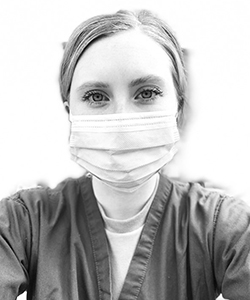
“These people need just the most basic nursing care. We’re dealing with vented patients, patients with trachs (tracheotomies). They are COVID-19 positive; some are now negative but had been positive. Just being able to be one piece of the recovery and helping them in the smallest way has been extremely rewarding, and I’m learning a lot from all my officers.”
Brenner joined the Army, and became interested in becoming a combat medic, which is an EMT equipped and trained to work on the battlefield. That led to her interest in nursing, and she completed the pre-nursing program at UW-Parkside and was accepted at UWM.
Even though she’s in a coronavirus hotspot, she’s not afraid for herself.
“We’ve been so many classes on donning and doffing our gear. We have to put on all PPE (personal protective equipment) before we go into a room. No one would ever expect us to rush into a room without the proper PPE, so I feel safe because we’re prepared.”
Her instructors at UWM have been flexible about her classwork, and she’s taken a couple of temporary “incompletes” just because of the time limits. “I would rather have more time to study and do well in my classwork just rush everything.”
She misses her family back in Racine but considers herself fortunate compared to the patients she’s working with who can’t have visitors. “The most they can do is an iPad or Facetime call. I feel lucky that I’ll get to go home to my family sooner or later.”
* * *
‘Kind of like a MASH unit’
Tracy Blair, an adjunct nursing instructor at UWM and Marquette, is also the team lead/supervisor for COVID-19 hotline and testing at Children’s Wisconsin. Working out of the first floor of the parking garage, she handles COVID-19 testing for any staff members who may need it as well as 80 patients a day who are going into surgery.
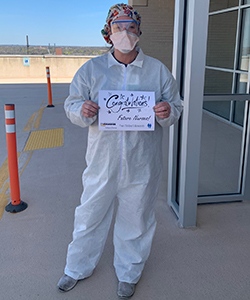
“We’re kind of like a MASH unit.”
Blair, who teaches nursing at UWM and Marquette, started helping out because it was the beginning of spring break, but ended up balancing online teaching with managing the testing process at Children’s.
She’s built on previous patient experiences to develop virtual clinical experiences for her students. In fact, one time when her own clinical work ran into class time, the students were able to join her virtually while she did nasal swabs. The students are appreciative. When she did evaluations with them, some of the students told her, “it’s nice to know in a virtual world, you can’t kill anybody, but you can still learn from your mistakes.”
And, busy as she is, she’s tried to make time to cheer others up by decorating her house with hearts and encouraged her Waukesha neighbors to do the same. “I wanted to offer a bit of cheer among the gloom.”
* * *
Nursing in a COVID-19 unit
Ariana Gonzalez was one of the many UWM students who’ve been working their regular jobs while taking classes, even through the coronavirus pandemic. She is a student in UWM’s nursing program as well as in the Honors College.
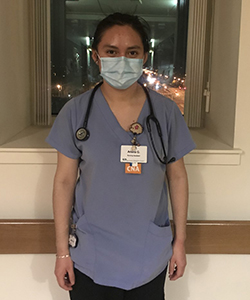
She was working as a nursing assistant at a local hospital when her urgent care floor became a COVID-19 unit and she took the opportunity to stay in the unit and help out. That work involved full personal protective equipment and an N95 mask when she was around patients, but she didn’t hesitate.
“I feel it’s my job to keep people healthy and safe regardless of the disease,” she said.
There are challenges, she said, as policies and guidelines seemed to change every day during the height of the crisis. All the while, she was also keeping up with her coursework online. “Sometimes it felt like there was more homework than usual.”
Gonzalez said she felt she was getting a lot of valuable experience, and patients were appreciative of her work. “It’s a critical time to be doing in-depth nursing.” While it was challenging balancing her job and her studies, “at the same time the reward is in helping others. I do feel appreciated. People are grateful.”
She chose UWM because of her interest in helping others, and just finished her sophomore year. “I love helping people, and I knew UWM has a great nursing program.” She added Honors College courses in English and the sciences to broaden her outlook, she said. Gonzalez plans to graduate in 2023.
